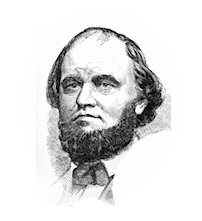(Private.)
Rome, Ga., April 11, 1861.
Dear Sir: You will have seen no doubt a few favourable notices of myself for next Governor. My inclination is to write a letter declining to have any such use made of my name. I have been restrained by the consideration, first, that it might possibly be of some use to our friends in the final struggle, even if my strength should be small. I am satisfied that Mr. Stephens intends to press Linton Stephens for that office. Failing in that he will press Mr. Crawford . . . or Benj. H. Hill. … I was very favourly inclined to Mr. Crawford but recent events have induced the belief that Mr. S. again has control of him. I do not know how Mr. Colquitt stands nor what are his prospects. I think James Jackson is the man upon whom we should concentrate our strength.
My own inclination is to retire entirely from all contests involving office. I do not want any, and unless something should be voluntarily tendered in the line of my profession I would not take any; therefore the only interest I feel is to see our ancient foe in his true position. Gov. Brown’s friends are pressing him for President, Senator, and Governor. … I desire you to understand my opinion of Brown has not changed, and from a conversation he had in Savannah with some gentleman in the presence of Mr. Bartow as I learn he is watching the contests in Geo. with great interest and is delighted at the prospect of a collision between Stephens, Hill and Mr. Toombs on one side and you and your friends on the other, expecting to benefit by it himself. He has a certain strength and I think we had best let him alone, not advance him. I cannot understand the power by which Mr. S. controls and manages Mr. Toombs. It is to me the greatest mystery of the age.
I do not desire particularly to be informed of any line of policy on hand, and will try and fall in right if Judge Benning or Henry R. Jackson or any other friend believes that the use of myself will damage them in any way. I will promptly take it out of the way, for I say to you with entire truth I want nothing. I don’t know what we shall do in our district. Wright is anxious to be elected to Congress again. … I shall not interfere with him myself, having positively declined to run. I would be glad to see you and hope to do so at some point soon.
From Annual Report of the American Historical Association for the Year 1911.
John William Henderson Underwood (November 20, 1816 – July 18, 1888) was a U.S. Democratic politician. Elected as a Democrat to the United States House of Representatives from Georgia, he served from March 4, 1859 until January 23, 1861, when he withdrew, having joined the Confederacy.
Howell Cobb was an American political figure. A southern Democrat, Cobb was a five-term member of the United States House of Representatives and Speaker of the House from 1849 to 1851. He also served as the 40th Governor of Georgia and as a Secretary of the Treasury under President James Buchanan. Cobb is, however, probably best known as one of the founders of the Confederacy, having served as the President of the Provisional Congress of the Confederate States.
